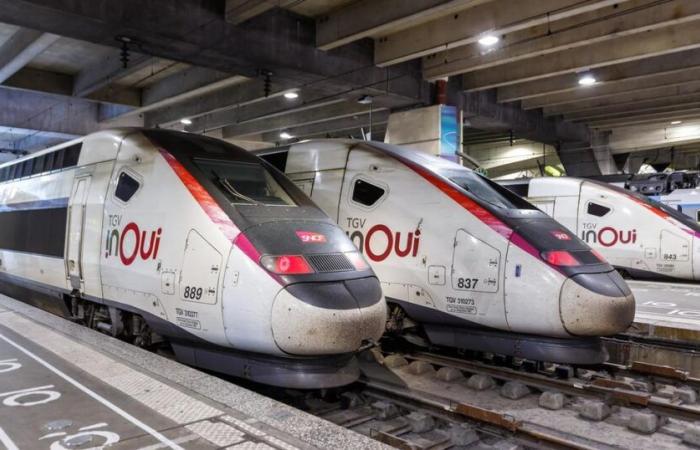The inter-union has called for a strike which threatens French travel for the end-of-year holidays. SNCF published its forecasts for Thursday.
Will the French be able to take the train at Christmas? At the end of November, all SNCF union organizations called for a renewable strike starting Wednesday, December 11 at 7 p.m. Since then, two of the four structures involved, Unsa and CFDT, have withdrawn their appeal after an agreement with the management of the railway group, while the CGT-Cheminots and Sud Rail have maintained it. Jean-Pierre Farandou, CEO of the group, urged in vain La Tribune Sunday railway workers to give up a strike “avoidable” and to “stay on the side of the French”this social movement raises fears of disruptions for the end-of-year holidays, as was already the case in 2019 during the mobilizations against pension reform, or in 2022 after a strike by controllers.
The verdict finally came on Tuesday, early in the afternoon: despite the declared desire of the mobilized unions to put pressure on management, the social movement should only have limited effects this Thursday. The railway group thus announces traffic «normal» on the TGV and Ouigo lines, and only expects some slight disruptions on the regional lines “with an average of 8 out of 10 trains in circulation on the TER and Transilien lines”. On a local scale, traffic will be “disturbed on certain lines”in several regions. The difficulties will be detailed every day, from 5 p.m. “on all information tools”adds the SNCF.
Discontinuity of SNCF Freight
This call for renewable mobilization responds to two union demands. On the one hand, a moratorium on the dismantling of Fret SNCF, whose 4,500 employees must be transferred on January 1 to two new companies, Hexafret and Technis. The agreement signed between management and the CFDT and the UNSA provides that railway workers will be able to retain all of their rights for 36 months, the time to negotiate a new working framework in the new companies. As a reminder, the decision to discontinue Fret SNCF, leader in the sector and holder of half of the market share in France, results from the opening of an investigation by the European Commission at the beginning of 2023 for illegal public aid.
On the other hand, the inter-union wishes to interrupt the spin-off of SNCF Voyageurs caused by the opening to competition of regional lines (TER, Intercités, Transiliens). As with freight, railway workers must be transferred in the coming weeks to the companies which win the tenders, whether SNCF subsidiaries or competing operators. Workers fear the new working conditions and remuneration, while the management of the railway group has committed to maintaining rights for 24 months instead of 15. “Given the fact that we are in a context where there is no government in front (…), it is better to suspend (the mobilization) now and see how the concrete implementation of all this goes happen, even if it means resuming the conflict in the spring if the promises are not kept”indicated the general secretary of the CFDT-Cheminots, Thomas Cavel.
Also read
SNCF: how in-house “greviculture” derailed freight activity
Wages, the real reason for the strike?
The mobilized unions, for their part, regret the disengagement of the reformists. “We could have extracted what we managed to obtain from Fret, namely the maintenance of rights for three years from SNCF Voyageurs, which is not the case”regrets Fabien Villedieu, federal secretary of Sud-Rail. A meeting organized on December 4 with François Durovray, resigning Minister of Transport, did not appease their anger. “One of our demands is to renounce the establishment of subsidiaries within the framework of passenger transport tenders. We also had a refusal on this point”confides to BFM TV Thierry Nier, general secretary of CGT-Cheminots. The 2025 budget rejected by the Assembly also provided for additional aid of 30 million euros for Fret SNCF, requested by Jean-Pierre Farandou for the survival of the subsidiaries. The 4,500 employees risk being transferred “in boxes whose economic viability is not guaranteed” insists Thierry Nier.
Some believe that wages are the real reason for the strike. At the end of November, the SNCF was less generous than in previous years by proposing average increases of 2.2% for 2025. “Inflation is falling considerably, so it is normal to adjust,” explained Jean-Pierre Farandou in La Tribune Dimanche. From 2022 to 2024, the remuneration of railway workers increased by 17% on average, and even by 21% for low salaries, when cumulative inflation reached 13%. In a press release, Sud-Rail denounces this proposal which “acts a loss of purchasing power for railway workers” et “leaves only crumbs of SNCF profits”. This was the last time that salary negotiations took place before Christmas, with the Transport Minister having requested that they now be held at the start of the year.






